Highlights
2018 | 2017 | 2016 | 2015 | 2014 | 2013 | 2012 | 2011 | 2010 | 2009 | 2008 | 2007 | 2006 | 2005 | 2004 | 2003 | 2002 | 2001 | 2000 | 1999 | 1998 | 1997 | 1996
2019
2019 Year-in-Review
2019 was a very active and impactful year at the NEA. During this year, the NEA released flagship reports on the system costs of electricity, the supply of medical radioisotopes and the long-term operation of nuclear power reactors. It organised conferences and workshops corresponding to the needs of member countries in the application and exploration of nuclear science and technology, including the country-specific nuclear safety culture forum in Finland and the first Global Forum on Innovation for the Future of Nuclear Energy. The Agency also continued its efforts in enhancing international co-operation with events such as the first Roundtable for International Co‑operation in Final Disposal of High‑level Radioactive Waste and Spent Fuel. Watch our year‑in‑review video here to see the highlights and key moments of 2019.
 Nuclear and Social Science Nexus: Challenges and Opportunities for Speaking Across the Disciplinary Divide
Nuclear and Social Science Nexus: Challenges and Opportunities for Speaking Across the Disciplinary Divide
The NEA organised a workshop on the "Nuclear and Social Science Nexus: Challenges and Opportunities for Speaking Across the Disciplinary Divide" on 12‑13 December 2019. The first‑of‑its‑kind event brought together over 100 participants, including social science and humanities researchers, academic nuclear engineers, practitioners and policy makers. The participants examined the current scope of research in the social sciences with a focus on nuclear energy, and identified ways of transforming research findings into recommendations for practice. The two‑day workshop aimed to build intellectual bridges across the nuclear and social sciences, as well as the academic and practitioner divides. Selected papers from the workshop will be published in a forthcoming special issue of the nuclear engineering journal Nuclear Technology. Workshop participants expressed a keen interest in developing inter- and transdisciplinary research collaborations and continuing their dialogue beyond the workshop. The NEA will work to identify opportunities for such collaborations in the coming months.
 Exploratory Meeting on Improving the Gender Balance in Nuclear Energy
Exploratory Meeting on Improving the Gender Balance in Nuclear Energy
As is the case for many areas of science and technology, women are significantly under-represented in technical and leadership positions in the nuclear sector. This lack of gender diversity may have substantial impacts on the future of nuclear energy in NEA member countries and certainly represents a loss of needed talent when the workforce is aging and many experts are nearing retirement. Attracting, recruiting and retaining women in science and technology, as well as enhancing the conditions and prospects for women and girls at every stage of their education and careers, is a challenge for which the NEA supports its member countries. In pursuit of these efforts, the NEA convened this week an "Exploratory Meeting on Improving the Gender Balance in Nuclear Energy".
The event brought together experts and professionals representing ministries, regulators, TSOs, international organizations from 12 NEA member countries. The participants exchanged information regarding the status of women in the nuclear sectors in their home countries and discussed what practical steps might be taken to address the challenges related to the participation of women in nuclear energy activities. They discussed short-term efforts to increase the number of women advancing to leadership positions, as well as long-term strategies to increase and accelerate the participation of women in nuclear field. During his remarks, Director‑General Magwood highlighted NEA initiatives such as NEA Mentoring Workshops and Global Panel of Universities. "We, at the NEA, believe the time is right to support our members by increasing the prominence of gender balance within national and global policy agendas, and finding paths to take substantive action," he said.
 New report and webinar on the supply of medical radioisotopes
New report and webinar on the supply of medical radioisotopes
The NEA hosted a webinar on 18 November 2019 to present findings from a new report on the supply of medical radioisotopes, jointly produced with the Organisation for Economic Co-operation and Development (OECD) Health Committee. Technetium-99m (Tc-99m) is the most commonly used medical radioisotope, essential for 85% of the nuclear medicine diagnostic scans performed worldwide. There are no comparable substitutes available for diagnoses of various cancers and for a range of diagnostics in children. Unfortunately, the global supply of Tc-99m is not technically and economically robust, and the existing supply-chain continues to experience chronic shortages. This new study analyses the current market structure and identifies barriers for the implementation of full cost recovery. If you missed the event, download the report and watch the webinar recording here: oe.cd/nea-med-rad-webinar-2019.
 NEA Director-General visits Brazil to discuss further enhancements to co-operation
NEA Director-General visits Brazil to discuss further enhancements to co-operation
NEA Director‑General Mr William D. Magwood, IV and senior staff visited Brazil on 4‑8 November 2019 for a series of meetings with various ministries and institutions, the Ministry of Mines and Energy (MME), the Ministry of Science, Technology, Innovation and Communication (MCTIC), the Ministry of Foreign Affairs (MRE), the Institutional Security Cabinet, and the National Nuclear Energy Commission (CNEN). Technical visits were also made to the Angra Nuclear Power Plant, the Nuclear and Energy Research Institute (IPEN), and the São Paulo Naval Technology Centre (CTMSP). While in Brazil, Director‑General Magwood gave a lecture on the current state and future prospects for nuclear energy to students and faculty at the University of São Paulo. The Director‑General's visit to Brazil was an excellent opportunity to exchange views on nuclear power, education and research, as well as on how to continue strengthening the NEA's engagement with Brazilian entities.
 NEA Steering Committee for Nuclear Energy
NEA Steering Committee for Nuclear Energy
On 25‑26 October 2019, the NEA held the biannual meeting of the Steering Committee for Nuclear Energy, the highest decision making body at the NEA in which all 33 member countries are represented. The committee is primarily made up of senior officials from national atomic energy authorities and associated ministries. It oversees and shapes the work of the Agency to ensure its responsiveness to member countries' needs. Among the highlights of the October meeting was a discussion on NEA considerations on nuclear technology evolution. The Committee heard about the NEA's progress in establishing the Global Council of Universities on Nuclear Energy Technology Policy and Education, in which leading universities from around the world will engage important human capital issues and other long‑term challenges. Mrs Anne Lazar‑Sury (France) and Mr James R. Warden (United States) were designated as new Vice‑Chairs to the Bureau of the Committee to support Chair Dr Marta Žiaková (Slovak Republic). The meeting agenda also included a presentation on the recent NEA Workshop on Stakeholder Involvement: Risk Communication – Dialogues towards a Shared Understanding of Radiological Risks. The meeting continued with a Policy Briefing on Small Modular Reactors (SMRs).
 Advancing international co-operation on radioactive waste disposal
Advancing international co-operation on radioactive waste disposal
Policymakers from fifteen countries met in Paris today to discuss the role of government in international co‑operation on advancing the development of national radioactive waste disposal programmes. The first Roundtable for International Co‑operation in Final Disposal of High‑level Radioactive Waste and Spent Fuel was jointly organised by the Nuclear Energy Agency (NEA), the Ministry of Economy, Trade, and Industry (METI) of Japan, and the United States Department of Energy (US DOE).
During his opening remarks, Director‑General Magwood noted that international co‑operation can help achieve national solutions through the exchange of information and co‑ordination of policies, and by developing a consensus on international standards. "There have been intensive technical and scientific collaborations over the years," he said. "However, international dialogues at the strategic and policy levels can help further facilitate the exchange of existing approaches, both in the implementation of the HLW management policies, programmes and in regulatory oversight."
Read more
Trust is essential for effective risk communication
Stakeholder involvement is key to achieving decisions that are accepted and sustainable for the use of nuclear energy and technologies. To this end, and as a follow‑up to the 2017 Workshop on Stakeholder Involvement in Nuclear Decision Making, the NEA held the Workshop on Stakeholder Involvement: Risk Communication on 24‑26 September 2019 to shed light on the complex challenges and best practices of communicating issues related to radiological risk. The workshop opened with video remarks from the OECD Secretary‑General Angel Gurría. Keynote remarks were delivered by H.E. Minister János Süli, Hungary's Minister without Portfolio, responsible for the Paks Nuclear Power Plant expansion, and Hon. Stefano Vignaroli, Member of Parliament and President of the Waste Committee of the Chamber of Deputies of Italy. Through panel discussions and interactive sessions, the workshop served to support 170 officials from 36 countries in identifying and developing the tools and approaches needed to foster dialogue and shared understanding of radiological risks between officials, experts and stakeholders.
The event brought together nuclear regulators, government agencies, elected officials, operators and representatives of civil society, including ordinary citizens and NGOs. Hearing stakeholders' concerns and viewpoints was a key highlight of the workshop, with a special session featuring a school administrator and high school students from Fukushima Prefecture who shared their candid views about radiological risk communication in the context of the Fukushima Daiichi crisis and its aftermath. Many discussions highlighted that building trust is essential for effective risk communication through local and long‑term engagement. Chairs and representatives of NEA Standing Technical Committees indicated that their committees would discuss possible follow‑up actions identified by the workshop. A summary report of the workshop and its outcomes is currently in preparation.
 Committee of the Italian Parliament visits the NEA
Committee of the Italian Parliament visits the NEA
An Italian delegation led by the Honorary Stefano Vignaroli, President of the Parliamentary Commission of Inquiry for Illegal Activities related to the Waste Cycle and for Related Environmental Crimes, visited the NEA on 27 September 2019 for high‑level discussions on radioactive waste and decommissioning. Discussions also touched on the NEA activities in the area of nuclear technology education, including the NEA Nuclear Education, Skills and Technology (NEST) Framework. Mr Vignaroli's visit enabled detailed exchanges of information and ideas, and his remarks at the NEA Workshop on Stakeholder Involvement: Risk Communication highlighted the important policy aspects of public communication.
 NEA and OECD support for Fukushima
NEA and OECD support for Fukushima
The NEA and the OECD, together with the government of Japan, Fukushima Prefecture and the Fukushima Innovation Coast Framework Promotion Organisation (FIPO), are organising a series of Policy Dialogues on Developing Decommissioning Industry Clusters in Fukushima. The aim is to contribute to the long‑term sustainable development of the area and local economy. As part of this dialogue series, the NEA and the OECD co‑organised a meeting on 26‑27 September 2019 to explore ways to enhance decommissioning capability, improve quality of life and boost local job creation in the Fukushima region during the decommissioning of the Fukushima Daiichi Nuclear Power Plant. Following the two‑day meeting, participants also met with representatives from SHINSEI, a local non‑profit organisation based in Koriyama, Fukushima. SHINSEI provides training and job placement assistance to people with disabilities who were affected by the Great East Japan Earthquake. The participants also spent time with evacuees with disabilities to understand the impact of the 2011 accident on the current living standards of those who have special needs. They also took the opportunity to discuss how to enhance the sustainability of local communities.
 World Nuclear Association and the OECD Nuclear Energy Agency launch new partnership
World Nuclear Association and the OECD Nuclear Energy Agency launch new partnership
The World Nuclear Association has today signed a Memorandum of Understanding (MoU) with the OECD Nuclear Agency at a ceremony in London. Under the MoU, both organisations have agreed to share best practices and co‑operate to support the wider understanding of nuclear energy and its development, to enable more effective and efficient nuclear safety, to exchange on improved approaches to decommission deactivated facilities, to enhance the legal frameworks associated with various international nuclear activities such as transport, and to support the economic and efficient use of nuclear energy. Read more
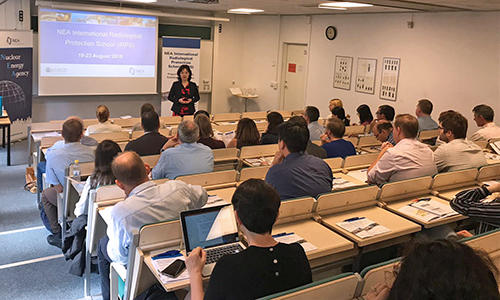 Preparing tomorrow’s radiological protection leaders
Preparing tomorrow’s radiological protection leaders
The second session of the NEA International Radiological Protection School (IRPS) is being held this week at the Centre for Radiation Protection Research (CRPR), Stockholm University, with the support of the Swedish Radiation Safety Authority (SSM). 31 participants from 14 countries were welcomed on Monday by Yeonhee Hah, Head of the NEA Division of Radiological Protection and Human Aspects of Nuclear Safety; Nina Cromnier, Director General of the Swedish Radiation Safety Authority (SSM); and Professor Ylva Engström, Vice Dean (prodekan) of Stockholm University Natural Sciences Faculty. The five day training features lectures and dialogues by renowned radiological protection experts on the history of the development and implementation of the international system of radiological protection. Find out more about the IRPS and this year’s programme at oe.cd/nea-irps.
 Nuclear in a changing world
Nuclear in a changing world
The NEA participated in Nuclear in a changing world, a conference organised jointly by FORATOM and the Romanian Atomic Forum – ROMATOM on 26 June 2019 in Bucharest, Romania. The goal of the conference was to discuss key challenges affecting the energy sector in Europe, the role of long‑term nuclear power plant operations, and skills and capacity management in the nuclear field. NEA Director‑General William D. Magwood, IV was a keynote speaker in the opening session of the conference. During his speech, Director‑General Magwood discussed the costs of decarbonising electricity systems, the importance of modernising the electricity markets, and the potential for small modular reactor technologies. The NEA was also represented at the conference by Ms Yeonhee Hah, Head of the NEA Division of Radiological Protection and Human Aspects of Nuclear Safety, who participated in the session "How to ensure we have the necessary skills" as a panellist and addressed the importance of decades‑long knowledge management given the long life cycles of nuclear facilities. She also highlighted the NEA activities in the area of skills management, including the NEA Nuclear Education, Skills and Technology (NEST) Framework and the recent workshop on human capital and leadership challenges co‑organised with the International Atomic Energy Agency (IAEA) and the World Association of Nuclear Operators (WANO).
 Women in Nuclear Global Annual Conference
Women in Nuclear Global Annual Conference
In June, the NEA also participated in the 27th Women in Nuclear Global Annual Conference, which provided a forum for professional women in the nuclear field on 17-21 June 2019 in Madrid, Spain. Ms Yeonhee Hah presented the "NEA Approach: Improving Gender Balance in Nuclear Energy" at the conference session on Women in the Nuclear Field. During her presentation, she highlighted ongoing NEA activities, such as the International Mentoring Workshop Series in Science and Engineering organised with the objective to encourage female high school students to explore careers in science and engineering. In 2019, two more workshops will be held: the first one in Fukushima, Japan, in August and the second one in Vigo, Spain in September. Another workshop is planned for university students and scheduled to take place in Moscow, Russia, in October.
Discussions on nuclear science
The NEA Nuclear Science Committee (NSC) held its biannual meeting on 12‑14 June 2019. At this meeting, NSC Chair John Herczeg and NSC Vice‑Chair Alain Zaetta stepped down after having led the Committee for over decade. Kemal Pasamehmetoglu of the United States and Gilles Bignan of France were elected as the new Chair and Vice‑Chair, respectively. Following presentations on the status of the Committee's programme of work, participants endorsed the creation of a task force to review and prioritise the programme based on the current needs expressed by member countries. Highlights reported at the meeting included the launch of the Nuclear Education, Skills and Technology (NEST) Framework, and the progress made by the NSC and NEA Committee on the Safety of Nuclear Installations (CSNI) in establishing a new multi‑national NEA Framework for In‑pile Fuel and Material Irradiation Experiments (FIDES) in response to the closure of the Halden Reactor. The Committee noted the importance of these two projects for the nuclear community, and endorsed the efforts of the NEA Division of Nuclear Science to facilitate these new endeavours. In support of this cross‑cutting approach, the meeting participants acknowledged the recent advances in NSC engagement with other NEA Standing Technical Committees and proposed that the Bureaus of the NSC and the CSNI explore joint sessions at their meetings.
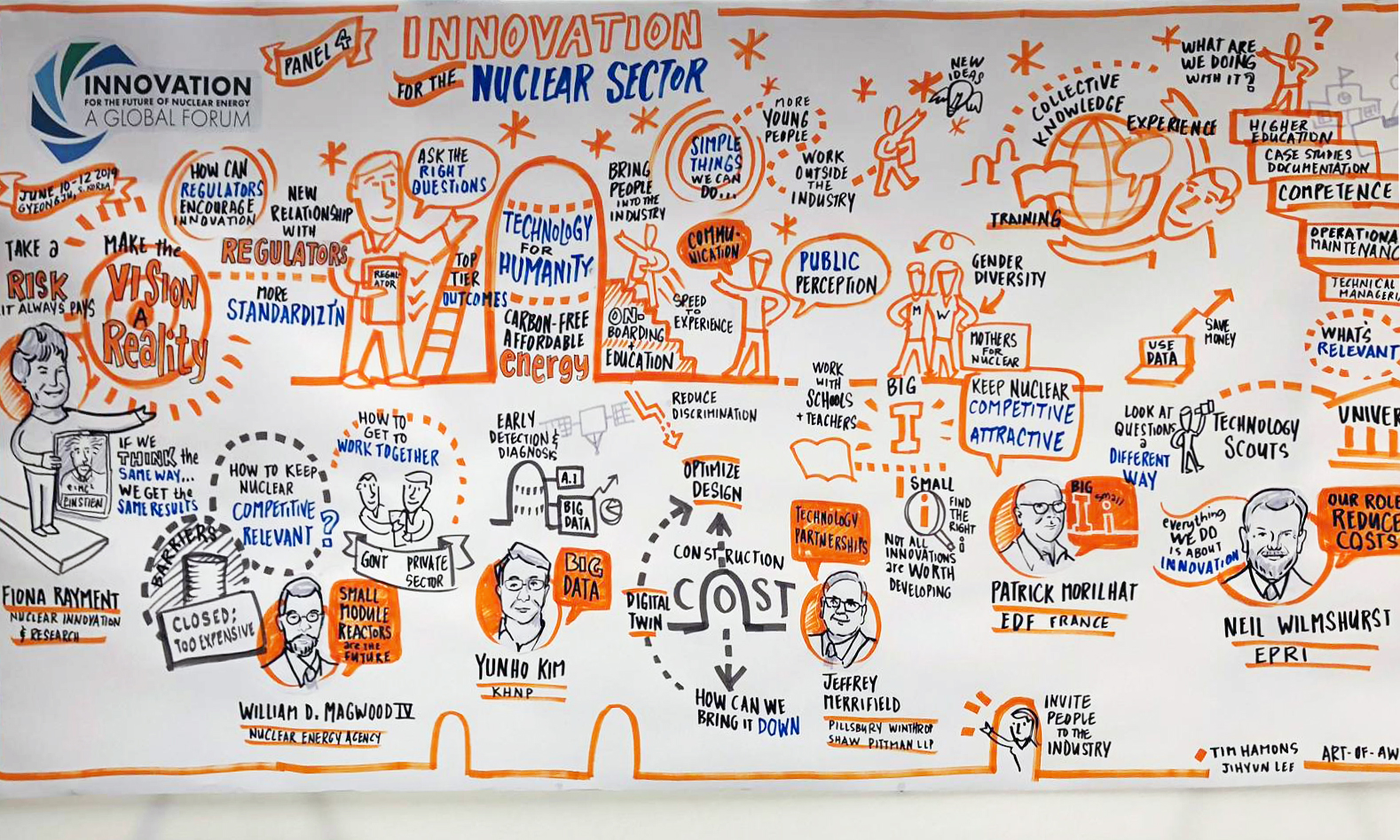 Global Forum on Innovation for the Future of Nuclear Energy
Global Forum on Innovation for the Future of Nuclear Energy
The first Global Forum on Innovation for the Future of Nuclear Energy took place in Gyeongju, Korea, on 10‑13 June 2019, organised jointly by the NEA, the Electric Power Research Institute (EPRI), the International Atomic Energy Agency (IAEA), Korea Hydro & Nuclear Power (KHNP) and the United Kingdom National Nuclear Laboratory (NNL). The event brought together a selective group of key stakeholders in the nuclear field who participated in interactive discussions on accelerating nuclear innovation. On the first day of the forum, NEA Director‑General William D. Magwood, IV participated in a panel session to make a baseline status update on innovation in the nuclear sector. On the second day he chaired a roundtable on regulatory insights, during which several high‑ranking regulators discussed the role of nuclear regulatory authorities in fostering innovation. During this session, Dr Fiona Rayment of the NNL joined Director‑General Magwood to launch a new summary of the outcomes of the NEA Nuclear Innovation 2050 (NI2050) initiative. The two and a half day forum concluded with the elaboration of a short list of follow‑up actions. The next Global Forum for Nuclear Innovation will take place in the United Kingdom in 2020, hosted by the NNL.
 Human capital and knowledge management in nuclear
Human capital and knowledge management in nuclear
The availability of skilled staff is a cornerstone of the sustainability of the nuclear energy sector both in countries already operating nuclear facilities, and those introducing nuclear power or dismantling plants. The NEA, the IAEA, and the World Association of Nuclear Operators (WANO) held a joint workshop on 5 June 2019 to discuss common human capital and leadership challenges. The workshop discussions focused on human capital in the context of both operating nuclear power plants and new builds, keeping in mind that these human capital issues impact equally the whole nuclear life cycle from research and development, to refurbishment projects, decommissioning and dismantling, waste management as well as the supply chain. As a result of this workshop, the three organisations will consider where and what additional efforts are needed in order to attract, hire, retain and develop a talent base, and ensure the safe and effective use of nuclear energy and technology.
 Nuclear energy in the spotlight at the 10th Clean Energy Ministerial in Vancouver
Nuclear energy in the spotlight at the 10th Clean Energy Ministerial in Vancouver
The NEA participated in the Tenth Clean Energy Ministerial (CEM10), which was hosted by the Government of Canada on 27‑29 May 2019. NEA Director‑General Magwood provided a keynote presentation at the NICE Future initiative side event Breakthroughs: Flexible Nuclear Energy Systems in a Clean Energy World. During his speech, he highlighted the role of nuclear energy within the context of clean energy systems of the future. During this event, the International Energy Agency (IEA) launched a new report entitled Nuclear Power in a Clean Energy System, which concludes that nuclear power can play an important role in clean energy transitions around the world. The event also showcased the NICE Future initiative's Breakthroughs: Nuclear innovation for clean energy systems, a collection of stories about nuclear innovations and how they enable clean energy systems. Dr Sama Bilbao y León, Head of the NEA Division of Nuclear Technology Development and Economics, provided insights on the flexibility of nuclear systems at the side event Dispatchable Clean Energy: Cutting the Cost of a Low‑Emissions Future (CEM).
 IEEJ/APERC Joint International Energy Symposium
IEEJ/APERC Joint International Energy Symposium
The NEA participated in the 4th IEEJ/APERC International Energy Symposium, which was held in Tokyo, Japan on 17 May 2019. Jointly organised by the Institute of Energy Economics, Japan (IEEJ), and the Asia Pacific Energy Research Centre (APERC), the event focused on three questions: 1) How can we maintain good energy governance under uncertain geopolitical developments? 2) What will be an appropriate energy mix for the energy transition? 3) What policies, corporate strategies and changes in awareness are needed to combat climate change? NEA Director‑General Magwood gave a presentation on the future role of nuclear power in the global energy mix. During his presentation, he emphasised that all low‑carbon technologies, including nuclear energy, are needed in order to meet global energy and environmental requirements, and must be applied in an optimised fashion.
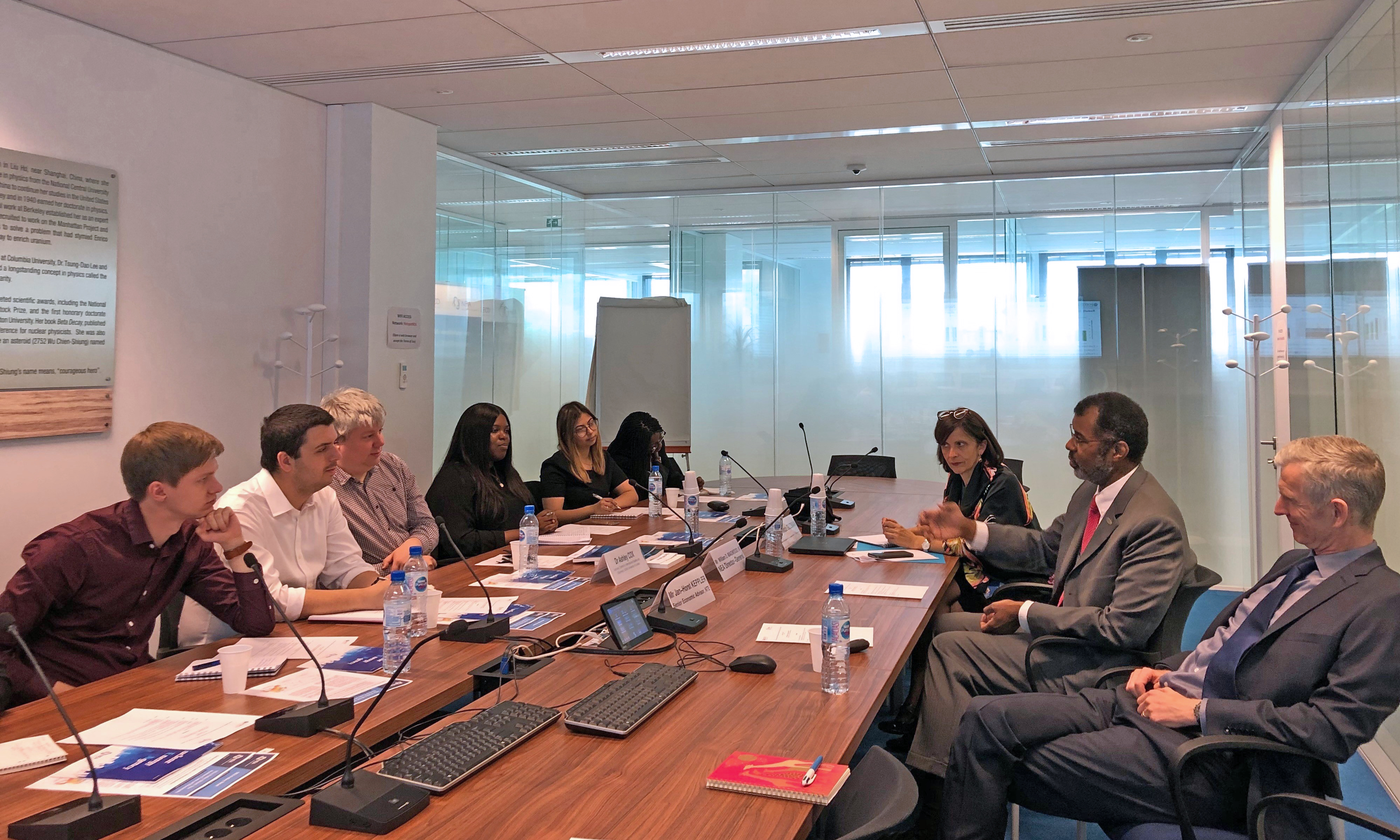 SOAS University of London visits the NEA
SOAS University of London visits the NEA
Students and faculty from the School of Oriental and African Studies, University of London, visited the NEA on 7 June 2019 to learn about the Agency, its role in the international nuclear energy arena and its work on the economics of nuclear power. NEA Director‑General Magwood and Senior Economic Advisor Jan Horst Keppler discussed with the students the true costs of decarbonisation and the electricity systems that will enable countries to meet carbon emission goals in the most cost‑effective manner.
 NEA DG participates in the European Nuclear Energy Forum (ENEF) in Prague and visits the Temelín Nuclear Power Station
NEA DG participates in the European Nuclear Energy Forum (ENEF) in Prague and visits the Temelín Nuclear Power Station
The NEA participated in the 14th European Nuclear Energy Forum on 29‑30 April 2019. Organised under the auspices of the European Commission (EC) and the Czech Republic, the conference brought together representatives from EU governments, European institutions, the nuclear industry and regulators, electricity consumers, and civil society. The event was opened by the Prime Ministers of the Czech Republic and the Slovak Republic, and the Romanian Minister of Energy. The Forum focused on two topics: "Ageing and long‑term operation of nuclear power plants in Europe - challenges and opportunities" and "2050 Long‑term strategy".
NEA Director‑General Mr William D. Magwood, IV was a featured speaker in the opening session of the conference, which was moderated by Gerassimos Thomas, EC Deputy Director General for Energy. During his speech, Director‑General Magwood discussed the costs of decarbonising electricity systems, and noted, "If we are to realise the energy transformation to which all here aspire, the markets must be reformed to reflect true costs and to incentivise the choices and investments needed for the future." He also highlighted the importance of nuclear technology education and the potential for small modular reactor technologies.
While in the Czech Republic, Director‑General Magwood visited the Temelín Nuclear Power Station, which is the largest power resource in the country with its 2 000 MW of installed capacity. He reviewed the changes made at the plant to further enhance safety and a new project to apply nuclear‑generated steam to provide municipal heating. When implemented in 2021, this project will enable the city of České Budějoviceto decrease the burning of coal it burns 80 000 tons each year.
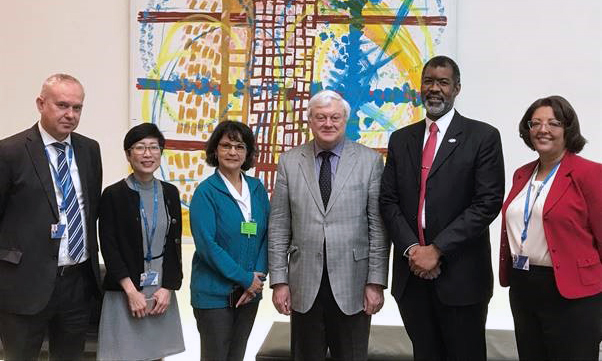 Decommissioning of nuclear installations and legacy management
Decommissioning of nuclear installations and legacy management
One of the NEA’s strengths is its system of standing technical committees. These committees enable the Agency to be flexible and responsive to the changing policy needs of member countries. The newest NEA standing technical committee, the Committee on Decommissioning of Nuclear Installations and Legacy Management (CDLM) held its first plenary meeting on 21 March 2019. Comprised of policy developers and technical experts representing regulatory bodies and implementers, the committee was formed to facilitate comprehensive exchanges of national experiences and lessons learnt in the field. It also provides a platform for NEA member countries to advance the state of the art in both decommissioning and legacy management. Chair of the NEA Radioactive Waste Management Committee (RWMC), Mr Jean-Paul Minon (centre, right) launched the meeting and officiated over the election of Ms Haidy Tadros as the first chair of the CDLM. They are pictured below with NEA Director-General, Mr William Magwood, IV, Head of NEA Division of Radioactive Waste Management and Decommissioning, Ms Rebecca Tadesse, and senior members of the NEA staff. More information on the work of the CDLM is available here.
 Country‑specific safety culture forum in Finland
Country‑specific safety culture forum in Finland
One of the many important lessons learnt about nuclear safety over the years has been that safety culture is as important as any technical issue that may arise in the course of nuclear operations. 60 experts from the Finnish nuclear community and international observers from seven countries came together in Helsinki, Finland, on 6‑7 March to discuss country‑specific national attributes that may impact the safety culture. The event was organised by the NEA, in close co‑operation with the World Association of Nuclear Operators (WANO) and the Finnish Radiation and Nuclear Safety Authority (STUK). During his remarks at the opening session, NEA Director‑General William D. Magwood, IV, highlighted the importance of understanding the national context and its relation to safety culture in order to ensure continued enhancement of nuclear safety. A summary report of the forum and its outcomes is currently in preparation. Read more
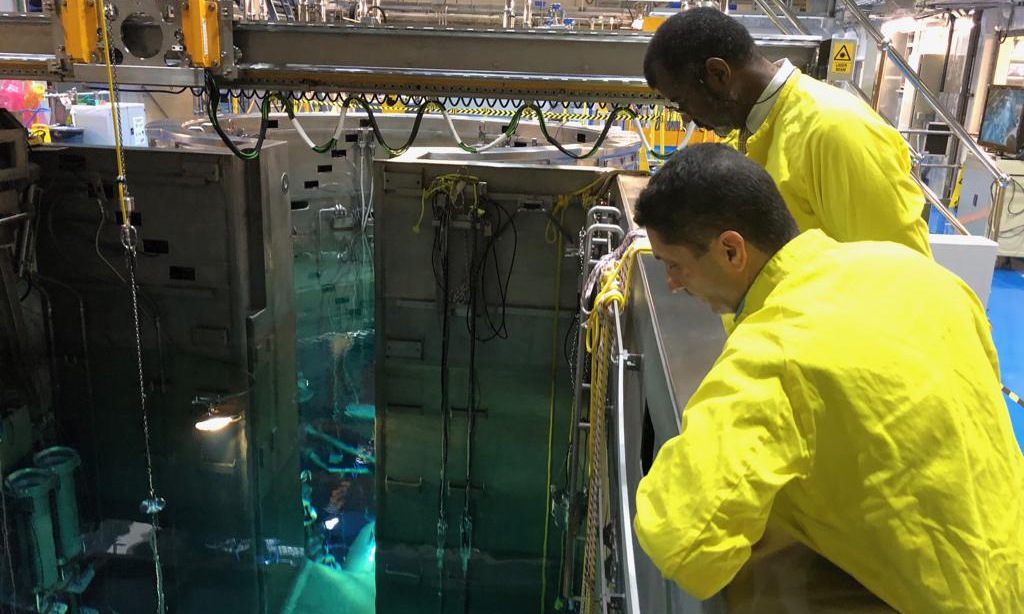 NEA Director‑General's first official visit to Australia
NEA Director‑General's first official visit to Australia
NEA Director‑General Mr William D. Magwood, IV, undertook his first official visit to Australia this week for meetings with the Ministry of Energy, the Australian Safeguards & Non-proliferation Office (ASNO), the Australian Radiation Protection and Nuclear Safety Agency (ARPANSA), the Australian Nuclear Science & Technology Organisation (ANSTO), and the Energy Policy Institute of Australia (EPIA).
Australia has no nuclear power plants, but is the world's third largest uranium producer, holding about 30% of the world's total identified resources. Meetings with the Australian authorities highlighted uranium resource issues, but also focused on NEA analyses related to the decarbonisation of electricity systems, radioactive waste management and the NEA Nuclear Education, Skills and Technology (NEST) Framework. Also, while Australia has no current plans to build nuclear plants, in 2016 the country joined the Generation IV International Forum (GIF) for which the NEA acts as Technical Secretariat. As such, discussions with the Australian authorities covered R&D on advanced nuclear systems.
While in Australia, Director‑General Magwood visited the Open Pool Australian Lightwater (OPAL) reactor, a major producer of radioisotopes for medical applications. Australia has been a key participant in the NEA High‑level Group on the Security of Supply of Medical Radioisotopes and helps contribute to international supply through the OPAL reactor. Technical visits were also made to the Australian Centre for Neutron Scattering and the Synroc pilot plant.
On 1 March, Director‑General Magwood participated in the Nuclear Futures Forum organised by the University of New South Wales (UNSW) and delivered a lecture on NEA work and activities to UNSW students and faculty.
 NEA Director‑General visits Russia
NEA Director‑General visits Russia
NEA Director‑General Mr William D. Magwood, IV and senior staff visited Russia on 15 February to meet with ROSATOM Deputy Director-General Nikolay Spasskiy and staff. Discussions with ROSATOM covered a wide range of issues, including ROSATOM's approach to human resource development, ROSATOM programmes for leadership development and capacity building for co‑operation with international organisations. Discussions also included future co‑operation on experimental support for fuels and material development and safety culture, as well as on a number of NEA initiatives such as the NEA International Mentoring Workshop in Science and Engineering and the country‑specific safety culture forum series. During this meeting, ROSATOM also confirmed their participation in the NEA Nuclear Education, Skills and Technology (NEST) Framework Agreement, which has been established to foster a new generation of nuclear experts and leaders.
While in Russia, Director‑General Magwood met with the rector of the National Research Nuclear University MEPhI (Moscow Engineering Physics Institute) Professor Mikhail Striikhanov and gave a lecture on the current state and future prospects for nuclear energy to students and faculty. A Memorandum of Agreement between the NEA and the MEPhI was signed during this visit. The Director‑General's visit to Russia was an excellent opportunity to exchange views on nuclear safety, education and research, as well as on how to continue strengthening the NEA's engagement with Russian entities.
 G20 Ministerial Meeting on Energy Transitions and Global Environment for Sustainable Growth
G20 Ministerial Meeting on Energy Transitions and Global Environment for Sustainable Growth
On 12-13 February, the NEA participated in the preparatory meetings for the G20 Ministerial Meeting on Energy Transitions and Global Environment for Sustainable Growth, which will be held on 15-16 June 2019. During the meetings, G20 countries discussed viable pathways, structural strategies and changes in transforming the energy sector towards zero-carbon energy systems. Dr Gloria Kwong, Deputy Head of the NEA Division of Radioactive Waste Management and Decommissioning, participated in the preparatory meeting and encouraged the G20 countries to engage in dialogue on developing final radioactive waste disposal solutions and contributed supporting information on nuclear energy. Another key contribution to the meeting was the recent NEA study that scrutinises the costs of decarbonising the electricity sector and sets out a policy framework for achieving carbon emissions targets in the most cost-effective manner. Download the report here: oe.cd/nea-system-costs-2019
 The European Commission (EC) visits the NEA to discuss further co operation
The European Commission (EC) visits the NEA to discuss further co operation
A European Commission (EC) delegation led by Gerassimos Thomas, the Commission's Deputy Director General for Energy, visited the NEA on 31 January 2019 for high-level discussions on the current state of nuclear technology and ongoing collaboration between the two organisations. Discussions also touched on the recent NEA studies on electricity system costs and the decarbonisation of electricity systems. The NEA wishes to thank the European Commission delegation for their visit, which enabled detailed exchanges of information and ideas.
 Decarbonising the Electricity System:
Decarbonising the Electricity System:
Time to Act Now
Many nations have committed to ambitious goals to limit emissions. Yet the world is not on track to achieve these environmental goals, nor are countries pursuing these policies in a cost effective way, concludes the Organisation for Economic Co‑operation and Development Nuclear Energy Agency (NEA) in its new report The Costs of Decarbonisation: System Costs with High Shares of Nuclear and Renewables. "We have at our disposal technically mature, low‑carbon alternatives to help countries reach their environmental and energy security goals - including: solar and wind technology, hydroelectricity and nuclear power. Reaching these goals will require us to use all of these low‑carbon resources in an economically sound manner," said NEA Director‑General William D. Magwood, IV, at the report's launch in Budapest, Hungary in the presence of János Süli, Minister without portfolio responsible for the Paks II., a nuclear new‑build project in Hungary. Read more
 Webinar: calculating the system costs of decarbonisation
Webinar: calculating the system costs of decarbonisation
On 17 January 2019, the NEA will organise a webinar to discuss the findings from its latest report – The Costs of Decarbonisation: System Costs with High Shares of Nuclear and Renewables. This report assesses the costs of alternative low-carbon electricity systems capable of achieving strict carbon emission reductions consistent with the aims of the Paris Agreement. It analyses several scenarios of deep decarbonisation achieving the same stringent carbon emission target but characterised by different shares of variable renewable technologies, hydroelectric power and nuclear energy. The launch webinar will feature introductory remarks by the OECD Secretary‑General Ángel Gurría and NEA Director‑General William D. Magwood, IV, who will lead a discussion on the importance of system costs in assessing the overall costs of the energy transitions under way. Find out more and register at oe.cd/nea-system-costs-webinar-2019.
2018 Year-in-Review
2018 was a very active and impactful year at the NEA. It marked the 60th anniversary of the Agency and brought other milestones, including the establishment of the new NEA Committee on Decommissioning of Nuclear Installations and Legacy Management. During this year, the NEA released flagship reports on emergency management, electricity costs, nuclear law and advanced nuclear fuels. It also organised events, conferences and workshops corresponding to the needs of member countries in the application and exploration of nuclear science and technology for peaceful purposes. The NEA sincerely thanks all of you for following us and for being part of the NEA community. Watch our year‑in‑review video here to see the highlights and key moments of 2018.
2018
![]() Just published: Uranium 2018 – Resources, Production and Demand
Just published: Uranium 2018 – Resources, Production and Demand
Jointly prepared by the NEA and the International Atomic Energy Agency (IAEA), the 27th edition of the "Red Book" presents data from 41 uranium producing and consuming countries. The new edition provides the most recent review of world uranium market fundamentals and presents a statistical profile of the world uranium industry. It offers updated information on established uranium production centres and mine development plans, as well as projections of nuclear generating capacity and reactor‑related requirements through 2035, in order to address long-term uranium supply and demand issues. Individual country reports offer detailed information on recent developments in uranium exploration and production, on environmental activities, regulatory requirements and on relevant national uranium policies. Read more at oe.cd/nea-2018-07
 NEA Director-General visits China to further enhance technical co-operation
NEA Director-General visits China to further enhance technical co-operation
NEA Director General Mr William D. Magwood, IV and senior staff visited China on 7-9 November for a series of meetings with various ministries and institutions, including the Ministry of Ecology and Environment (MEE)/National Nuclear Safety Administration (NNSA), the China Atomic Energy Authority (CAEA), and the National Energy Administration of China (C/NEA). Technical visits were also made to the China Institute of Atomic Energy (CIAE) and the Sanmen Nuclear Power Plant, where the world's first AP1000 third-generation nuclear reactor (Sanmen 1) is now connected to the grid. Discussions with the Chinese authorities covered a wide range of issues, including the electricity markets in China, nuclear safety culture, safety case for the disposal of radioactive waste, decommissioning and legacy management, stakeholder involvement and small modular reactors. Underlining the enhanced technical co-operation between the two parties, the first NEA-China Forum will be held in May 2019 with a focus on radioactive waste management and decommissioning.
 Accident Tolerant Fuels: Prospects and Possibilities
Accident Tolerant Fuels: Prospects and Possibilities
The NEA will host a webinar on Accident Tolerant Fuels: Prospects and Possibilities on Tuesday, 20 November 2018 at 16:00-17:00 Paris time. Accident tolerant fuels may offer opportunities to enhance the safety and competitiveness of commercial nuclear power plants. The NEA, as a part of its effort to advance the scientific bases needed for the development of advanced nuclear fuels, has recently published the State-of-the-Art Report on Light Water Reactor Accident-Tolerant Fuels. The report reviews the most promising advanced fuel and cladding concepts in terms of their fundamental properties and behaviour under normal and accidental conditions, maturity of technologies, supporting R&D; activities, experimental data and modelling results. Find out more and register at oe.cd/nea-atf-webinar-2018
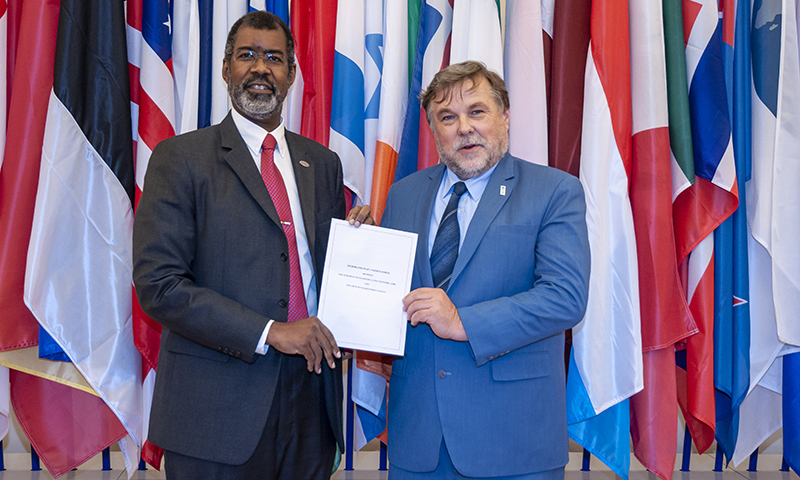 ENEN and NEA sign MOU to foster nuclear education and training
ENEN and NEA sign MOU to foster nuclear education and training
The European Nuclear Education Network (ENEN) and the NEA have signed a Memorandum of Understanding to co-operate in the field of nuclear education, training and knowledge transfer – an increasingly important concern for NEA member countries. The MoU aims to advance the ENEN and NEA's common aim of improving existing educational activities in the nuclear field, and maintaining the capability and expertise necessary to ensure the continued safe and efficient use of nuclear technology. ENEN and the NEA will cultivate joint efforts to develop education tools, approaches, methods and opportunities that will help foster the development of the next generation of nuclear scientists.
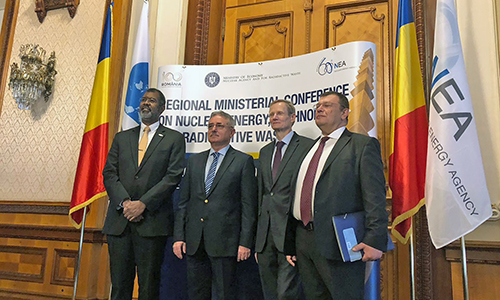 Regional ministerial meeting to discuss nuclear energy, technology and radioactive waste management
Regional ministerial meeting to discuss nuclear energy, technology and radioactive waste management
Ministers and senior officials from 10 countries are exploring the benefits of enhanced regional co‑operation in the field of nuclear energy during a two day ministerial meeting in Bucharest, Romania. Co‑organised by the NEA and the government of Romania, the meeting was opened by the Vice Prime Minister of Romania, Viorel Ştefan, who confirmed the government's full support for enhanced regional co‑operation to meet the energy, socio‑economic and environmental goals of the future. A session featuring ministerial statements from all participating countries highlighted the importance of regional co‑operation on nuclear energy, technology and radioactive waste management. Read more
Decommissioning of nuclear installations and legacy management
The NEA Committee on Decommissioning of Nuclear Installations and Legacy Management held a kick-off meeting on 16-17 October 2018 in Paris, France. In close co-ordination with other NEA committees, the new committee will lead NEA activities in the areas of decommissioning of nuclear installations and legacy management. Comprised of policy developers and technical experts representing regulatory bodies and implementers, the committee will facilitate comprehensive exchanges of national experiences and lessons learnt in the field. It will also provide a platform for NEA member countries to share information on national policies and best practices in order to advance the state of the art in decommissioning and legacy management. During this week’s kick-off meeting, the participants held operational discussions on the structure and governance of the committee, as well as on its guiding documents, including its mandate, statement and future programme of work. "The CDLM has been created to address an issue of growing importance for all NEA member countries - whether they are building new nuclear power plants or phasing them out," said the Chair of the CDLM kick-off meeting, Jean-Paul Minon. "This new committee will enable the NEA to assist its members in defining strategies to address a broader range of decommissioning and legacy management issues."
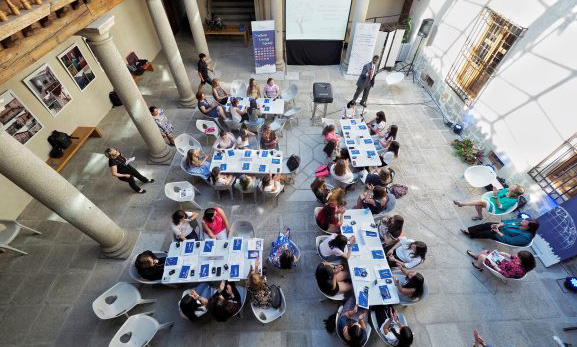 Encouraging female scientists of the future
Encouraging female scientists of the future
Building on the two previous successful events organised in Japan to encourage young female students to pursue science, technology, engineering and mathematics (STEM), the third NEA International Mentoring Workshop in Science and Engineering was held on 24 September 2018 in Avila, Spain. The event was jointly organised with Women in Nuclear (WiN) Spain and co-sponsored by the Spanish Nuclear Safety Council (CSN), the City Council of Ávila, and the Electric Power Research Institute (EPRI). The workshop featured opening remarks by Director-General Magwood, as well as a presentation on the NEA-led initiative by Yeonhee Hah, NEA Head of the Division of Radiological Protection and Human Aspects of Nuclear Safety. In his opening remarks, Director-General Magwood told participants, "We encourage you to consider careers as engineers and scientists. We need you." The workshop brought together 50 female high-school students from Spain with twelve highly accomplished women mentors, including the NEA's Sama Bilbao y León, Head of the Division of Nuclear Technology Development and Economics, and Olvido Guzmán, Radiological Protection Specialist. During the workshop, the mentors exchanged their experiences and shared advice and insights with the students. Discussions also addressed the difficulties faced by women professionals in many parts of the world and the steps that can be taken to support young women who aspire to work in these fields.
 Global co-ordination of low-dose research
Global co-ordination of low-dose research
The NEA organised a scoping meeting on the global co‑ordination of low-dose research on 17-18 September 2018. The event brought together 35 participants representing radiological protection research platforms, regulatory authorities and research organisations. Participants addressed issues relating to low-dose radiation research and identified ongoing and planned research programmes, as well as existing national, regional and other research collaboration and co-operation mechanisms. They also discussed mechanisms to more effectively foster global research collaboration and co-operation. It was agreed that research co-ordination, both at the national and international levels, has proved to be efficient and effective. The meeting participants recommended that the NEA should establish a high-level group to support the development of a global co-ordination and mutual support initiative. Accordingly, a proposal will be developed and presented for consideration to the NEA Committee on Radiological Protection and Public Health (CRPPH) in March 2019.
 Country-Specific Safety Culture Forum: Sweden
Country-Specific Safety Culture Forum: Sweden
The NEA organised a first-of-its-kind nuclear safety culture forum in January 2018 in Sweden, in co operation with the World Association of Nuclear Operators (WANO) and the Swedish Radiation Safety Authority (SSM), to examine the potential safety culture challenges arising from the national context. The event examined how nuclear safety culture is affected by the national cultural context of the country operating a nuclear facility. A new NEA report presents the results from the forum, based on views of representatives of the Swedish nuclear community, as expressed during focus group discussions and interviews held at the event. Find out more at oe.cd/nea-csscf-sweden The NEA organised a first-of-its-kind nuclear safety culture forum in January 2018 in Sweden, in co operation with the World Association of Nuclear Operators (WANO) and the Swedish Radiation Safety Authority (SSM), to examine the potential safety culture challenges arising from the national context. The event examined how nuclear safety culture is affected by the national cultural context of the country operating a nuclear facility. A new NEA report presents the results from the forum, based on views of representatives of the Swedish nuclear community, as expressed during focus group discussions and interviews held at the event. Find out more at oe.cd/nea-csscf-sweden
 CAEA visits the NEA to discuss further enhancements to co‑operation
CAEA visits the NEA to discuss further enhancements to co‑operation
China Atomic Energy Authority (CAEA) Chairman Mr ZHANG Kejian (张克俭), accompanied by the Chairman of the China National Nuclear Corporation (CNNC), Mr YU Jianfeng, and senior representatives from the CAEA and other Chinese organisations, held high-level discussions with NEA Director-General Mr William D. Magwood, IV, and senior staff on 12 September 2018. Their discussions focused on ongoing co-operation and technical exchanges within the framework of the existing Joint Declaration on Co-operation in the Field of Peaceful Uses of Nuclear Energy and opportunities for future co-operation. During the discussions, NEA Director-General Magwood noted that the collaboration between the NEA and China over the past five years has enabled valuable exchanges of information and ideas from which both NEA membership and China can benefit. China has sent representatives to a growing array of NEA meetings and fora and is a full participant in the Generation IV International Forum (GIF), the Multinational Design Evaluation Programme and the International Framework for Nuclear Energy Co-operation, three NEA-serviced bodies, as well as in seven NEA joint projects. The NEA Director-General and staff meet with Chinese officials and institutions on a regular basis and the Director-General is scheduled to visit China in November for further discussions and to visit one of the newly operational Chinese nuclear power plants applying the Generation III+ AP1000 technology.
 Mr Nobuhiro Muroya has been appointed Deputy Director‑General for Management and Planning. He took up his duties on 10 September 2018.
Mr Nobuhiro Muroya has been appointed Deputy Director‑General for Management and Planning. He took up his duties on 10 September 2018.
Mr Nobuhiro Muroya will work closely with the Director‑General and the other members of the senior management team of the NEA, providing leadership and oversight of the management of the Agency to assure that it is working effectively and efficiently to meet the needs of its member countries.
Prior to joining the NEA, Mr Muroya was the Minister's Secretariat at the Ministry of Education, Sports, Science and Technology (MEXT) of Japan. He previously supervised both the Secretariats of the Atomic Energy Commission (AEC), which directs the Japanese government's overall nuclear energy policy, and the Council for Science, Technology and Innovation (CSTI), which establishes national strategy for the advancement of science and technology.
Mr. Muroya holds a Bachelor degree of Engineering from the Tokyo Institute of Technology and a Master degree of Public Policy Management from the University of London.
 Bridging the gender gap: NEA initiative to encourage girls to pursue STEM
Bridging the gender gap: NEA initiative to encourage girls to pursue STEM
Following its successful debut in July 2017, the NEA International Mentoring Workshop in Science and Engineering returned to Japan for the second year. Joshikai II for Future Scientists was held on 8‑9 August 2018 in Tokyo, in co‑operation with the Japan Atomic Energy Agency (JAEA), in order to motivate young female students to explore science and engineering careers, and to suggest ways to overcome any barriers they may face along the way. Read more
 NEA Director‑General visits Korea
NEA Director‑General visits Korea
NEA Director‑General Mr William D. Magwood, IV, and senior staff visited Korea in August for a series of meetings with various ministries and institutions, including the Ministry of Foreign Affairs (MOFA), the Nuclear Safety and Security Commission (NSSC), the Korea Atomic Energy Research Institute (KAERI) and the Korea Radioactive Waste Agency (KORAD). During his visit to the NSSC, he held his first meeting with the NSSC Chairman Kang Jungmin and discussed further enhancements in co‑operation between the NSSC and the NEA. While in Korea, Director‑General Magwood also participated in the World Nuclear University (WNU) Summer Institute as an invited leader and gave a presentation entitled "Looking Forward ‑ Nuclear Energy Issues and Opportunities". During his speech, he highlighted the need for nuclear innovation, the long‑term role of nuclear energy within the context of global climate change and the importance of attracting young people to study nuclear science and engineering. The NEA is one of the founding organisations of the World Nuclear University (WNU) Summer Institute.
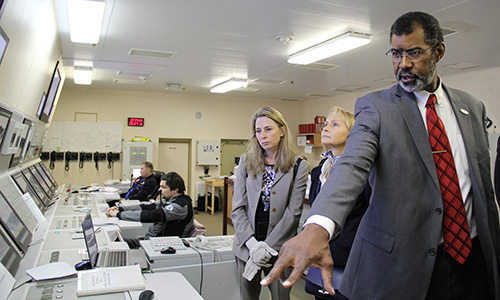 NEA high-level visit to Russia
NEA high-level visit to Russia
NEA Director‑General William D. Magwood, IV, and senior staff visited the Russian Federation on 26‑27 July for a series of meetings with the ROSATOM State Nuclear Energy Corporation and technical visits. Central to his visit were meetings with Mustafa Kashka, Rosatomflot Acting Director, and Vitally Trutnev, Director of ROSENERGOATOM Directorate for the Construction and Operation of Floating Nuclear Thermal Power Plants. The NEA delegation conducted a technical tour of Rosatomflot facilities and the Akademik Lomonosov, Russia's first floating nuclear power plant, which is currently being fueled in Murmansk. Technical visits were also made to Lenin Nuclear Icebreaker Museum and SevRAO, the northern centre of Rosatom subsidiary RosRAO which provides back‑end radioactive waste and decommissioning services for Russia's submarine fleet and commercial customers.
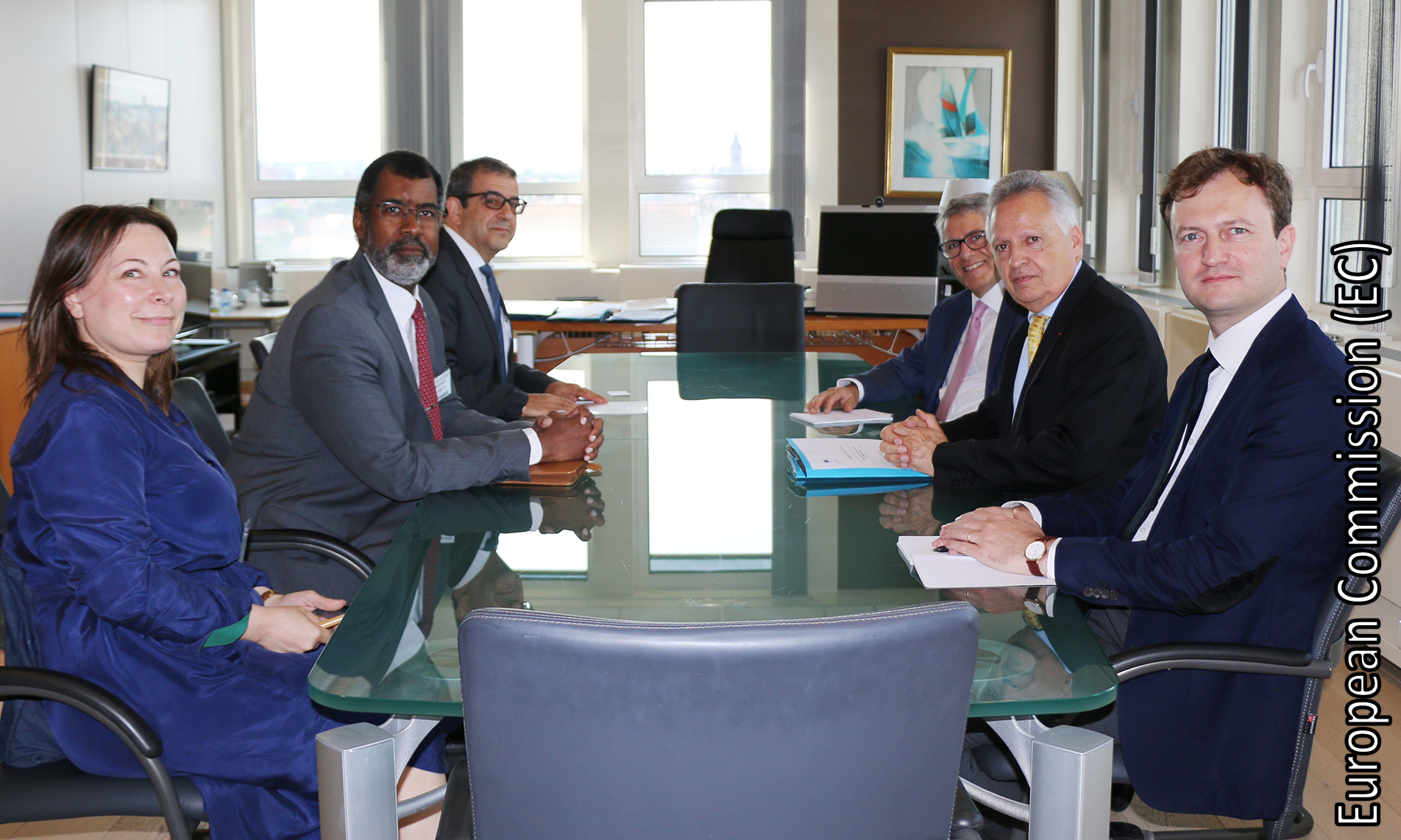 The European Commission (EC) and NEA discuss areas of mutual interest
The European Commission (EC) and NEA discuss areas of mutual interest
NEA Director‑General William D. Magwood, IV, accompanied by senior staff, met with the European Commission Director‑General Dominique Ristori on 24 July 2018 to discuss the current state of nuclear energy, ongoing collaboration between the two organisations, and plans for further strengthening co‑operation in the future. Discussions with European Commission officials also covered the importance of ensuring an effective and efficient nuclear supply chain and the importance of maintaining nuclear technology skills capacity. While in Brussels the NEA delegation met with Pierre Jean Coulon, President of the European Economic and Social Committee (EESC) Section for Transport, Energy, Infrastructure and the Information Society.
 Hungarian Minister János Süli visits the NEA to discuss the Paks project
Hungarian Minister János Süli visits the NEA to discuss the Paks project
János Süli, Hungary's Minister without Portfolio, responsible for the Paks Nuclear Power Plant expansion, Becskeházi Attila Csaba, Secretary of State for infrastructure development, innovation and localisation related to the maintenance of the capacity of the Paks Nuclear Power Plant, and Ambassador Zoltán Cséfalvay, Permanent Representative of Hungary to the OECD, visited the NEA on 26 June 2018 for high‑level discussions. The Hungarian delegation met with NEA Director‑General William D. Magwood, IV, and senior staff to provide the NEA with updates on the Paks Nuclear Power Plant project. Discussions also addressed electricity system costs and the decarbonisation of electricity systems. The NEA wishes to thank the Hungarian delegation for the visit which enabled detailed exchanges of information and ideas.
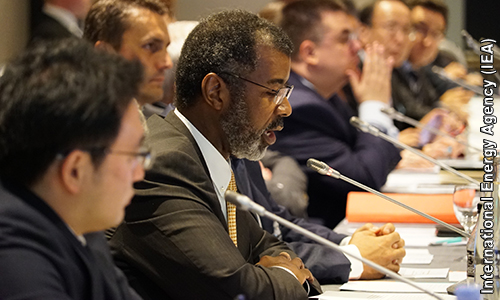 The NEA participates in high‑level IEA meeting on the future of nuclear
The NEA participates in high‑level IEA meeting on the future of nuclear
NEA Director‑General Magwood and senior staff participated in a high‑level meeting entitled "Nuclear Energy: Today and Tomorrow", organised by the International Energy Agency (IEA) on 28 June 2018 in Paris, France. The event brought together high‑level participants from IEA member countries, industry leaders and academia who examined the role of nuclear energy in mature power markets, as well as its implications for energy security, the economy and the environment. "A consideration of the future of nuclear energy is complex not only because of technology and economic factors, which the NEA analyses closely on an ongoing basis, but also because of how it is reflected in global and national policy and politics," said NEA Director‑General Magwood at the meeting. During his speech, he also underlined the social and environmental factors of electricity provision, which affect individuals, economies and countries in ways that are not captured in market prices. He noted that the full costs of electricity generation must remain firmly on the radar of energy policy makers.
 Director-General Magwood's visit highlights NEA commitment to support Poland
Director-General Magwood's visit highlights NEA commitment to support Poland
NEA Director‑General William D. Magwood, IV, undertook his first official visit to Poland on 28‑29 May 2018 for meetings with the Ministry of Energy, the Ministry of Investment and Economic Development, the National Atomic Energy Agency (PAA) and the National Centre for Nuclear Research (NCBJ). Central to his visit were meetings with Krzysztof Tchórzewski, Minister of Energy, Jadwiga Emilewicz, Minister of Entrepreneurship and Technology and Jerzy Kwieciński, Minister of Investment and Economic Development. Discussions covered a wide range of issues, including nuclear safety technology and regulation, the human aspects of nuclear safety, stakeholder involvement, and nuclear development. Read more
 Japanese State Minister Tadahiko Ito visits the NEA to discuss further co‑operation
Japanese State Minister Tadahiko Ito visits the NEA to discuss further co‑operation
Mr Tadahiko Ito, State Minister of the Cabinet Office and of the Environment, Japan visited the NEA on 3 May 2018 to meet with NEA representatives including Deputy Director‑General and Chief Nuclear Officer Daniel Iracane, Deputy Director‑General for Management and Planning Masahiko Fujihara, and Deputy Head of the NEA Division of Radiological Protection and Human Aspects of Nuclear Safety Ted Lazo. State Minister Ito thanked the NEA for its contributions to the recovery of Fukushima after the Great East Japan Earthquake, and discussed possible follow‑up to the 2016 NEA workshop on "Post‑accident Food Safety Science" held in Fukushima. In particular, the Minister expressed his thanks for the NEA's support for the Soma Agricultural High School students who took part in the workshop, and underlined the importance of taking care of the younger generation during the Fukushima prefecture recovery process. The State Minister also gave an update on the impressive progress with off‑site decontamination in the surrounding areas of the Fukushima Daiichi Nuclear Power Plant and a nuclear emergency response exercise to be held in Japan later this year. Dr Iracane outlined ongoing work towards developing an international instrument to formalise the framework for post‑accident food management and the second NEA Workshop on Stakeholder Involvement in Nuclear Decision Making to be held in 2019.
 New NEA committee to focus on decommissioning and legacy management
New NEA committee to focus on decommissioning and legacy management
The NEA Steering Committee for Nuclear Energy held its biannual meeting on 19‑20 April 2018. Among the decisions taken, the committee approved the establishment of the new NEA Committee on Decommissioning of Nuclear Installations and Legacy Management, which will enable the NEA to assist its members in managing a broader range of decommissioning issues including the management of legacy sites and legacy waste. In forming the new committee, the NEA will convene a balanced composition of policy developers and experts representing regulatory bodies and implementers in order to facilitate comprehensive exchanges of experiences and best practices in the field of nuclear decommissioning and legacy management. Accordingly, the committee delegates will share their national expertise in decommissioning planning and strategies selection, as well as lessons learnt in managing decommissioning challenges. The new committee will co-ordinate closely with other NEA bodies, as well as with relevant activities in other multilateral institutions.
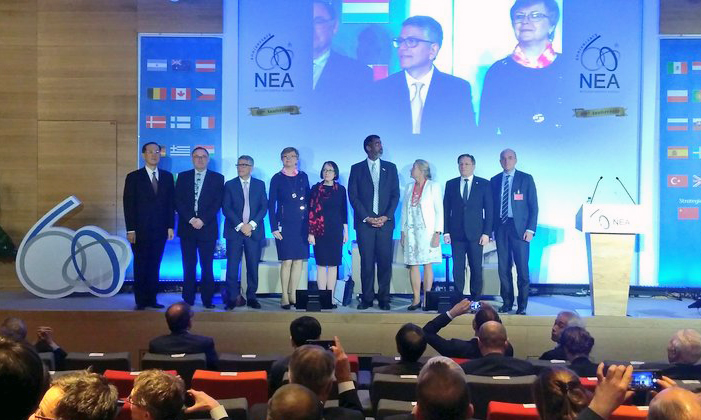 NEA celebrates its diamond jubilee by looking to the future
NEA celebrates its diamond jubilee by looking to the future
Nearly 200 senior leaders in the international nuclear sector from 31 countries came together in Paris today to celebrate the 60th anniversary of the OECD Nuclear Energy Agency (NEA) and to discuss the current state and future prospects for nuclear energy. To mark the occasion, the NEA organised a special high‑level session for senior leaders in the nuclear sector. "There have been many successes and accomplishments over the last 60 years. While we take this opportunity to recognise the tremendous contributions of the men and women who have served with the NEA over the decades, we are excited by the road before us, the challenges ahead and the as yet unknown priorities of tomorrow," said Director‑General Magwood during his opening remarks at the session. "The work of the NEA is always just beginning." Read more
 First reactivity-initiated accident test completed successfully at the renovated CABRI facility
First reactivity-initiated accident test completed successfully at the renovated CABRI facility
Within the framework of the NEA CABRI International Project (CIP) a first test simulating a reactivity initiated accident (RIA) in conditions reproducing those in a pressurised-water reactor (PWR) was successfully carried out on 16 April 2018. The test was performed at the Cabri facility in Cadarache, France by the Institut de Radioprotection et de Sûreté Nucléaire (Institute for Radiation Protection and Nuclear Safety - IRSN), with the support of the French Alternative Energies and Atomic Energy Commission (CEA), in the new pressurised-water loop that was installed recently as part of a major renovation programme.
The NEA CIP Project investigates fuel and cladding behaviour in PWRs during RIAs that involve a sudden localised accidental increase of core power that would arise from, for example, control rod ejection. The CIP began in March 2000 and two RIA tests using high burn-up PWR fuel were performed in 2002 in an experimental loop filled, at that time, with liquid sodium. "After ten years of major refurbishments, the Cabri reactor is now equipped with a new configuration that will enable the NEA CIP Project to study the safety behaviour of fuels in more fully representative PWR conditions," noted the NEA Deputy Director‑General and Chief Nuclear Officer Dr Daniel Iracane. "The successful completion of this test positions Cabri as a new major asset for the continuous enhancement of our knowledge base, and for the future of nuclear fuel safety worldwide."
More information on the NEA CIP project is available here.
![]() Webinar on the full costs of electricity provision
Webinar on the full costs of electricity provision
On 13 April 2018, the NEA organised a webinar to discuss the findings from its latest report – The Full Costs of Electricity Provision. Market prices and production costs account for an important share of the overall economic impacts of electricity. However, there has been a growing recognition that the market value of electricity is not the whole story. As currently constituted, the price of electricity in today's markets does not accurately reflect the costs of electricity on the society and the environment. As a result, decisions made regarding supply and future planning based on current market prices fail to capture all of the factors needed to ensure reliable electricity supply in the future. This report summarises and synthesises the most recent research in full cost accounting of electricity. Find out more at oe.cd/nea‑electricity‑costs‑webinar‑2018
 NEA co‑sponsors the joint conference of the International Youth Nuclear Congress (IYNC) and Women in Nuclear Global
NEA co‑sponsors the joint conference of the International Youth Nuclear Congress (IYNC) and Women in Nuclear Global
The NEA co‑sponsored the International Youth Nuclear Congress (IYNC) 2018 conference, which was organised jointly with the 26th WiN Global Annual Conference in Bariloche, Argentina, on 11‑17 March 2018. The conference brought together young professionals and women in the nuclear field to discuss and to collaborate on knowledge transfer, nuclear science and technology research and implementation, professional development and communication. NEA Director‑General Mr William D. Magwood, IV, who was recognised as a key supporter who helped launch the IYNC almost 20 years ago, was a featured speaker in the keynote session on "Challenge the present, empower the future". During his speech, he highlighted the need for nuclear technology to evolve to meet future challenges and the importance of attracting young students to study nuclear science and engineering. He also noted that the NEA encourages its membership to explore ways of attracting, recruiting and retaining women in science and technology. Ms Yeonhee Hah, Head of the NEA Division of Radiological Protection and Human Aspects of Nuclear Safety, provided a keynote speech at the launch of the IYNC Mentor Program. She was also a featured speaker in the workshop session on "Strategic Communication in a Nuclear Crisis". While in Argentina, the NEA delegation visited the Embalse Nuclear Power Station, which is currently undergoing a life extension programme.
 NEA official visit to Brazil
NEA official visit to Brazil
On 20 March 2018, the NEA visited The National Nuclear Energy Commission of Brazil (CNEN) to participate in an information exchange seminar organised by the CNEN's Directorate of Radiological Protection and Security (DRS) and attended by representatives from important actors in Brazil's nuclear power programme. NEA Deputy Director‑General and Chief Nuclear Officer Dr Daniel Iracane presented the Agency's activities, its role among international organisations and its work on nuclear technology, safety and radioactive waste management. Discussions addressed a wide range of associated issues, including stakeholder involvement. During the seminar NEA representatives were also introduced to the main lines of nuclear energy policy, research and education in Brazil. While in Brazil, the NEA delegation also visited the Angra Nuclear Power Plant and other institutions in order to gain insights into nuclear technology in Brazil. The seminar and the visit were both very informative and constructive, and took place in a spirit of openness, and mutual recognition of the benefits of international co‑operation. The NEA wishes to thank the CNEN and the Brazilian Ministry of Foreign Affairs for the well‑prepared seminar and fruitful exchanges during the visit.
 NEA Director-General makes first visit to Hungary
NEA Director-General makes first visit to Hungary
On 5-6 March 2018, NEA Director-General William D. Magwood, IV, undertook his first official visit to Hungary for meetings with the Ministry of National Development, Ministry of Foreign Affairs and Trade, the Hungarian Atomic Energy Authority (HAEA), Public Limited Company for Radioactive Waste Management (PURAM), the Hungarian Nuclear Society and the Hungarian Young Generation Network (FINE). Central to his visit were discussions with Minister János Süli (pictured on the right), Minister István Mikola, and State Secretary for Energy Affairs András Aradszki. While in Hungary, the Director General visited the Paks Nuclear Power Plant and various other nuclear facilities, including the CERES (Cooling Effectiveness on Reactor External Surface) facility, Budapest Research Reactor, PURAM Spent Fuel Interim Storage Facility, National Radioactive Waste Repository (NRWR) and the Hungarian Academy of Sciences Centre for Energy Research. On 6 March, he delivered the lecture “Addressing Global Nuclear Challenges in an Era of Change” to students and staff at the Institute of Nuclear Techniques (NTI) of the Budapest University of Technology and Economics (BME). The Director-General's visit to Hungary proved to be an excellent opportunity to exchange views on nuclear energy issues, education and research, as well as on how to continue strengthening the NEA's engagement with Hungarian entities.
 NEA high-level visit to China
NEA high-level visit to China
From 25 February to 1 March, NEA Director‑General Magwood led a high-level visit to China. Bilateral meetings were held with the Ministry of Environmental Protection (MEP), the National Nuclear Safety Administration (NNSA), the China Atomic Energy Authority (CAEA), the National Energy Administration (C/NEA) and the China National Nuclear Corporation (CNNC). Technical visits were made to the Qinshan Nuclear Power Plant and the Fuqing Nuclear Power Plant, where China is building the first Hualong One nuclear power reactor. The NEA delegation also visited some of the country's leading research centres, including the Shanghai Institute of Applied Physics (SINAP), which is leading China's development and demonstration of molten salt reactor technology; the Shanghai Nuclear Engineering Research and Design Institute (SNERDI) and the Chinese Academy of Sciences (CAS). On 28 February, Director‑General Magwood delivered a lecture on NEA work and activities to nuclear science and engineering students at Shanghai Jiaotong University (SJTU). The visit, which was very informative and constructive, exemplified the valuable exchange of information and ideas from which China and the NEA can both benefit. Highlighting the growing relationship between the NEA and China, the Agency will welcome in March a Chinese radioactive waste expert on secondment to work at the NEA in Paris for the next two years. She will be the first Chinese expert to join the NEA's main secretariat staff.
 First‑of‑its‑kind nuclear safety culture forum puts the spotlight on national context
First‑of‑its‑kind nuclear safety culture forum puts the spotlight on national context
The influence of national context on nuclear safety culture was the focus of the country‑specific forum held on 23‑24 January 2018 by the Nuclear Energy Agency (NEA) in Stockholm, Sweden, in co‑operation with the World Association of Nuclear Operators (WANO) and the Swedish Radiation Safety Authority (SSM). The purpose of this forum was to create awareness on potential safety culture challenges related to national context, with the objective of helping organisations maintain a healthy safety culture for safe operations of nuclear installations and for effective regulatory activities. The event brought together over 60 experts from the Swedish nuclear community and international observers from France, Finland, Japan, Korea, South Africa and the United States, representing the industry and regulatory organisations. Read more
![]() Just published: Towards an All-Hazards Approach to Emergency Preparedness and Response
Just published: Towards an All-Hazards Approach to Emergency Preparedness and Response
In the post-Fukushima context, emergency preparedness and response (EPR) in the nuclear sector is more than ever being seen as part of a broader framework. In order to achieve an all-hazards approach to emergency management, a major step in the process will be to consider experiences from the emergency management of hazards emanating from a variety of sectors. The NEA thus joined forces with the OECD and the European Commission's Joint Research Centre (JRC) to collaborate on this report, which confirms similarities in EPR across sectors, identifies lessons learnt and good practices for the benefit of the international community and demonstrates the value of an all hazards approach. Download the report at oe.cd/nea-all-hazards-pub-2018.
Webinar launching a new NEA flagship report
On 12 January 2018, the NEA will organise a webinar to launch its latest report – Towards an All-Hazards Approach to Emergency Preparedness and Response: Lessons Learnt from Non-Nuclear Events. This new NEA report promotes a comprehensive, all-hazards and transboundary approach to serve as the foundation for enhancing national resilience and responsiveness to emergency situations, created by natural, human-made, nuclear or non-nuclear crises. Built on contributions resulting from the collaboration between the NEA, the OECD and the EU Science Hub - Joint Research Centre, and enriched with a broad range of national experiences, the report will contribute to improve the preparedness of governments facing the challenges and societal expectations related to modern emergency crises. Find out more and register at oe.cd/nea-all-hazards-2018.